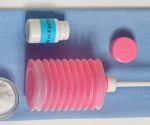How you manage your uterine prolapse on a daily basis depends to a large extent on the severity of your prolapse and the symptoms you are experiencing. However, one thing you should do is to try to prevent the prolapse from becoming worse. Stopping smoking, treating any cough, avoiding straining and lifting heavy objects, maintaining a normal body weight, and performing Kegel exercises are all ways to help prevent the prolapse from progressing.
The symptoms of uterine prolapse are often less severe in the morning and worse later in the day. This is because the upright position during the day allows gravity to pull down on the uterus, thus allowing it to sink lower and lower into the vaginal canal. When an individual with uterine prolapse lies down, the uterus shifts to a relatively higher position, so in the morning after a night of sleeping, the uterine prolapse will be less severe.
If you are experiencing leakage of urine, you may find it helpful to void at specific times, instead of waiting until you feel the urge. Avoiding or reducing drinks that contain alcohol or caffeine may also help reduce problems with leaking urine.
Continue Learning about Gynecology
Important: This content reflects information from various individuals and organizations and may offer alternative or opposing points of view. It should not be used for medical advice, diagnosis or treatment. As always, you should consult with your healthcare provider about your specific health needs.










